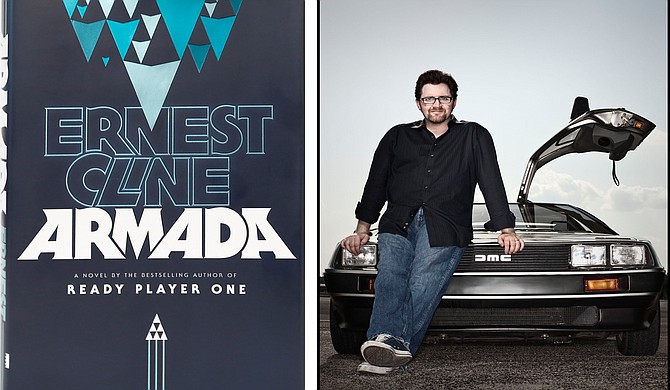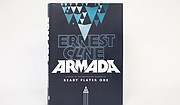Author Ernest Cline signs copies of his book, “Armada,” Thursday, July 30, at Lemuria Books. Photo courtesy Dan Winters
Author Ernest Cline has been in high demand since the release of his best-selling science-fiction tale, "Ready Player One" (Random House, 2011, $14). A bidding war and two movie deals later, he returns with his sophomore book, "Armada" (Crown Publishers, 2015, $26), which hit shelves July 14. The Jackson Free Press did a phone interview with Cline to talk about literature, films and his tenure as the king of "nerd-venture" novels.
I've had friends who aren't avid readers that were excited about "Ready Player One" and now "Armada." How do you reach them?
That's hard to say. I think maybe a lot of people don't pick up a book and find themselves in the book, you know, or find any trace of their friends in the story. When I wrote "Ready Player One," it was my first novel, and they tell you when you write your first book to write what you know and to write the book you've always wanted to read.
The kind of people I know and have surrounded myself with have always been geeks or nerds or people who are enthusiasts of something—people who take it too far, people who aren't just content to be a fan of a TV show. They have to cosplay, build a website, make an episode guide, go to conventions and take it to the extreme because they love it so much. I'm one of those people, so I end up writing about people like that. I also wanted to write in the voice I use when I talk to my friends, just assume they've seen all the stuff I've seen, which it turns out, everybody has.
You know, my obscure tastes aren't as obscure as I thought, even in Italy, Norway and Finland. I've gotten to go on book tours there, and I'm like, "How does this book even work over here?" Like, by the '80s, they were all watching "Knight Rider" and playing "Pacman," too.
Those elements can be a draw for some readers, but do you feel like they might also scare away those who don't know all the pop-culture references?
I feel like the pop-culture stuff in my books is sort of like the mythology in an "Indiana Jones" movie. You don't know about ancient Mesopotamia or the Inca tribes, but you get the sense of it. You know who the good guys and bad guys are. A lot of kids love the book just because it's a sort of straightforward adventure story, and it deals with having an online identity and online friends versus real-world friendships.
Almost 20 schools and different universities have selected "Ready Player One" as a common read for their whole incoming freshman class and are making everybody read it and have invited me to come and discuss it. To them, it reads like a multimedia primer on the '80s because if they don't recognize a song or something, they can just pull it up, see it immediately, listen to that song or watch that music video or whole movie. They can watch "War Games" on Netflix and things like that. It's not like how reading a book used to be. Now, you don't have to wonder about any reference. You can look it up instantaneously.
I'm surprised how it works across all generations and in other countries. I think it's just that people love a good adventure story, and it's like, pop culture is our culture. I always tell people that I don't know the difference between culture and pop culture because if it's not popular culture, then what is it? Unpopular culture? Why would you want to reference unpopular culture unless you're trying to seem smart or obscure or not convey your message? As a writer, you want to use all the tools you have to convey what you want to say. For me, that includes "Monty Python" references.
What's it like, after writing a book and the screenplay of that book, to hand over the reins to a director?
Well, I'm actually working on the screenplay for "Armada" now, but with "Ready Player One," I wrote the first two drafts of the screenplay all the way back in 2010, before the book even came out. Then, it's kind of been in development and been rewritten a few times since then, and now a friend of mine (screenwriter Zak Penn) is working on the script, and he's making changes for Steven Spielberg, who just signed on to direct. So, I don't even worry about that anymore.
That's like a dream situation. Zak is a great writer, and Steven Spielberg is one of my favorite directors and one of the most successful directors in the history of cinema. He also made a lot of the movies that inspired both of my books. "Ready Player One" and "Armada" are both inspired by "E.T.," "Close Encounters of a Third Kind," "Gremlins," "Back to the Future" and all the "Indiana Jones" movies. Like, (protagonist) Wade carries the Grail diary all through "Ready Player One" because he's an "Indiana Jones" fan. It's crazy that the guy who made those movies is now making my movie.
So before most people had even read the book, you were already writing the screenplay for the movie. What was that like?
You know, I think most of the people at Warner Brothers ended up reading the book since it was a best-seller, but ... there was a bidding war over both "Ready Player One" and the screenplay based on just the idea. ... Since it's become more popular, now they see it has an even bigger audience because of the fans for the book. "Armada" was different because I sold the same idea to both Random House and Universal Pictures, just this 30-page synopsis of the idea: What if the gamers of Earth could use their video-game consoles and iPads and other gaming platforms to control drones hidden all over the world to fight off an alien invasion?
That was an idea I'd never seen before in any science fiction. In "The Last Starfighter" or "Ender's Game" or "Star Wars"—which are all huge (inspirations) for me—nobody is controlling drones anywhere. Even in the far future, they're still putting people inside ships to go and die to blow up the Death Star. They can have holographic phone calls between planets with no loss, but they can't make remote-control TIE Fighters.
As soon as I had that idea, I was like, "Ah, that's great," because then it turns your video game console into a weapon you can use to protect your neighborhood. It's such a fantasy for all gamers, to wish that your gaming skills suddenly had real-world value. That was a story I knew I could spend a couple of years writing.
The "alien invasion" concept has been done in various ways. Did you feel pressure to make it stand out from other stories with that base?
I wanted to do kind of what I did with "Ready Player One" but in a different way. I wanted to do an alien-invasion story where all of the characters had seen all the alien-invasion movies that I had. It's like, in "The Walking Dead," nobody has ever seen a zombie movie.
I want an alien invasion story where everybody's seen "War of the Worlds," "Independence Day," "V," "Invasion of the Body Snatchers" and everything else, and they have all these preconceived notions about how an alien invasion would go and what would be a smart way to do it and why the aliens would be doing this. I wanted characters who were aware of the genre of story they found themselves in and, in that way, could defy the genre. When a trope is happening in the story, (they ask), "Why would this be happening?"
Why was "Armada" the story you wanted to write as a follow-up to "Ready Player One"?
I had just finished writing "Ready Player One" and the "Ready Player One" screenplay, and I didn't want to dive into writing a "Ready Player Two" or a sequel right away. I'm open to writing more in that universe later, but at the moment, I wanted to do something new. Still, I knew how hard it was to write a novel and knew I had to write about something I loved, something I was passionate about and something I would be excited to sit down and write every day.
("Armada") was the story that seemed the most like "Ready Player One." It involved video games, but it wasn't a video-game treasure hunt in the far future. It was an alien invasion with gamers in the near future. So it seemed similar enough to keep people who loved "Ready Player One" happy but different enough to hold my interest and let me write about drones and aliens as opposed to virtual reality and treasure hunts.
Was there anything that surprised you about adapting your books into a movie?
You have to kill your darlings. It's hard. I mean, it's hard to do that in a book, you know. It's hard to get the book down to 400 pages. But then once you've got your story down to a novel length where everything moves and works, then you have to write a 120-page version that can play out on a screen in two hours. You've got to whittle it down even further.
But you know, in a movie, a picture's worth a thousand words. If you have 24 pictures per second in two hours, I'm sure that works out. I should do the math on that. ... You have less time to tell the story, but you can tell the story in a much more visual way and convey things.
I don't know. You just have different tools to tell the story. But like with "Ready Player One," "Armada" is such a naturally cinematic idea. When I write a novel, it's like directing a movie on paper. I already had the movie in mind when writing the book, in this instance.
I'm having fun doing it. Even writing "Ready Player One," I didn't know what was going to happen or if it would become a movie, but now it's almost certainly becoming a Steven Spielberg movie, which means there's a very good chance "Armada" will become a movie. Writing a screenplay when you know it has a good chance of being a big summer alien-invasion movie, but different than all of them and competing with "Star Wars," it's really exciting. It's like I'm getting to do my own version of "Star Wars" that pays tribute to (it) while being different from it.
Ernest Cline signs copies of "Armada" at 5 p.m., Thursday, July 30, at Lemuria Books (4465 Interstate 55 N., Suite 202, 601-366-7619). For more information, visit lemuriabooks.com.



